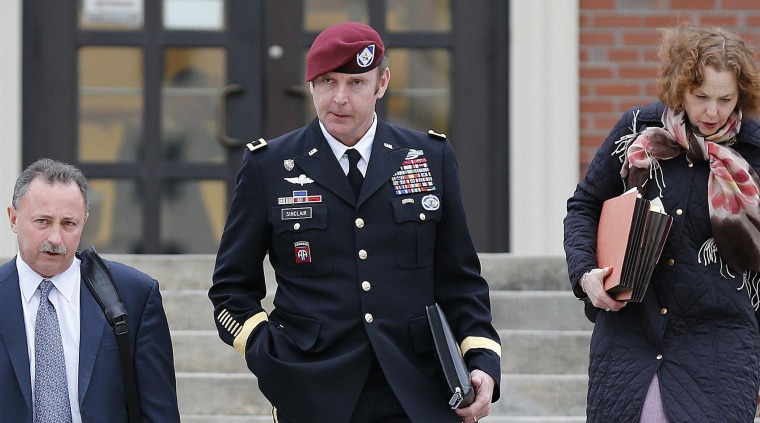A judge's ruling that military commanders may have improperly influenced the prosecution of Brig. Gen. Jeffrey Sinclair — putting his high-profile court-martial on hold — ironically came just days after the Senate failed to pass a bill that would have stripped brass of their authority over sexual assault cases.
The bill was sponsored by Sen. Kristen Gillibrand, D.-N.Y., who declined to comment on the specifics of the Sinclair case, but said her legislation would have prevented so-called "command influence" problems in any number of cases.
"Senator Gillibrand believes it is clear than an independent military justice system is not only the right thing to do for our men and women in uniform, but would also mitigate issues of undue command influence that we have seen in many trials over the last year," said her spokeperson, Glen Caplin.
Gillibrand's bill would have taken prosecuting authority away from commanders and given it to independent military prosecutors in cases of rape and other crimes punishable by one year or more.
After the Senate tabled her measure, it passed another bill — sponsored by Sen. Claire McCaskill, D- Mo., Sen. Kelly Ayotte, R- N.H., and Sen Deb Fischer, R- Neb. — that toughens procedures for investigating and trying cases of sexual assault in the military but does not make the prosecution independent.
"Command authority is the greatest vulnerability of the military system and also their greatest sensitivity."
In Sinclair's case, Judge Col. James Pohl said Fort Bragg officials' decision to reject a plea bargain being offered by prosecutors amounted to undue influence fueled by political concerns surrounding the issue of military sexual assault.
Pohl did not outright dismiss charges against Sinclair — who is accused of forcing his ex-mistress, a female captain, to perform oral sex after arguments — but the 51-year-old Army general can now try to forge a new plea deal while the court-martial is on hold.
Pentagon and U.S. Army officials had no official comment because the case is not over and anything they say could be construed as another example of command influence.
Military leaders had opposed Gillibrand's bill on the grounds that it would undermine the accountability and leadership of commanders.
Without commenting directly on the Sinclair case, one senior military official predicted there will likely be more "command influence" defense arguments in future sexual assault criminal prosecutions.
And Greg Jacob, policy director of the Service Women's Action Network and a former Marine, agreed."I'm sure every defense counsel is taking notes right now," he said.
"The Gillibrand bill that the Senate voted down would have really ameliorated this whole issue," he said.
Jacob said command influence cuts both ways — when officials decide not to bring charges where independent prosecutors might find a stronger case, and when they adopt a get-tough posture in cases that may be weak.
"Survivors want justice, but it's easier for them to understand a case was not pursued if a lawyer makes that decision than if the commander makes it," he said.
Unless the command-centric nature of the military justice system is reformed, the issue "is going to keep coming up over and over again."
Jonathan Turley, a constitutional and military law expert, said the military's legal eagles want their system to be viewed with the same respect as civilian proceedings, but its "flawed structure" is it's biggest weakness.
"Command authority is the greatest vulnerability of the military system and also their greatest sensitivity," he said.
